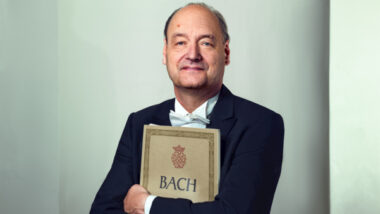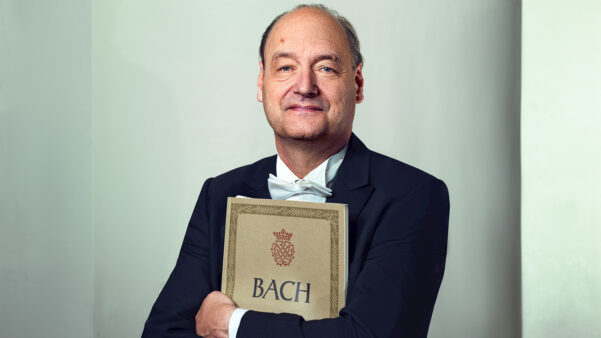 Switzerland Bach: Matthias Havinga (organ), Julia Becker (violino piccolo), Simon Fuchs (oboe), Isaac Duarte (oboe), Kaspar Zimmermann (oboe), Ivo Gass (horn), Robert Teutsch (horn), Tonhalle-Orchester Zürich / Jan Willem de Vriend (conductor). Tonhalle, Zürich, 21.4.2023. (VL)
Switzerland Bach: Matthias Havinga (organ), Julia Becker (violino piccolo), Simon Fuchs (oboe), Isaac Duarte (oboe), Kaspar Zimmermann (oboe), Ivo Gass (horn), Robert Teutsch (horn), Tonhalle-Orchester Zürich / Jan Willem de Vriend (conductor). Tonhalle, Zürich, 21.4.2023. (VL)

Bach – Brandenburg Concerto No.1 F major, BWV 1046; Sinfonia from the cantata ‘Ich liebe den Höchsten von ganzem Gemüte’, BWV 174; Organ concerto in D minor, (reconstr. after BWV 146, 188 & 1052); Sinfonia from the cantata ‘Wir müssen durch viel Trübsal in das Reich Gottes eingehen’ BWV 146; Adagio from the Harpsichord Concerto in D minor BWV 1052; Sinfonia from the cantata ‘Ich habe meine Zuversicht’ BWV 188, Allegro; Overture No.3 D major, BWV 1068
Bach fans recently got their money’s worth at the Tonhalle Zürich. Under the direction of Jan Willem de Vriend, the Tonhalle-Orchester Zürich presented a superb selection of Bach’s works.
At the beginning, de Vriend told the audience a bit about the background of the composition of the Brandenburg Concerto No.1 in F major, BWV 1046. Bach wrote the Brandenburg Concertos as a present for the Margrave Christian Ludwig of Brandenburg-Schwedt, who was a passionate music lover and hunting enthusiast. As a result, Bach incorporated the sound of the horn into his compositions, with the horns taking a particularly prominent role in the Brandenburg Concerto No.1.
Soloists for the First Brandenburg Concerto were: Julia Becker on violino piccolo, Simon Fuchs, Isaac Duarte, and Kaspar Zimmermann on oboes, and Ivo Gass and Robert Teutsch on horns, each of them with excellent performances.
During the first movement I was reminded of the sounds of the forest and through the presence of the horns, the thrill of the hunt was particularly noteworthy. In the second movement, violino piccolo and oboe are heard almost exclusively, performing an expressive plaintive duet. The star of the third movement is undoubtedly the violino piccolo, which asserts itself in a solo against the other instruments. The violino piccolo begins solo and after a while is supported by the tutti. The fourth movement, a lively and energetic finale to this masterpiece, was a fitting end to the magnificent work.
Second piece of the evening was Bach’s Sinfonia from Cantata BWV 174 ‘Ich liebe den Höchsten von ganzem Gemüte’, which is a church cantata that Bach wrote in Leipzig for Whit Monday. The Tonhalle-Orchester Zürich gave the piece a special energy that perfectly captured the nuances of Bach’s masterful composition. The piece begins with a lively orchestral introduction, which sets the tone for the rest of the movement. The musicians played with precision and passion, creating a dynamic and engaging performance.
The audience was then treated to a version of the piece ‘Wir müssen durch viel Trübsal in das Reich Gottes eingehen’, BWV 146, that was originally composed for harpsichord but adapted for organ and orchestra. The organ was played by the talented organist Matthias Havinga. His skilful playing brought out the full range of colours and tonalities that this impressive instrument had to offer.
Next, the audience was treated to two more Bach pieces originally composed for harpsichord but adapted for organ and orchestra. The Adagio from the Cembalo Concerto in D minor, BWV 1052, showcased again the impressive virtuosity of the organist, while the Sinfonia from the cantata ‘Ich habe meine Zuversicht’, BWV 188, drew the audience further into the rich and complex musical world of Bach.
The last piece of the concert was the famous and beloved Overture No.3 in D major, BWV 1068. The composition showcases Bach’s exceptional talent for crafting complex musical patterns and weaving together multiple melodic lines with great skill.
The highlight of this piece is the second movement – ‘Air’ – which is very well known and is often mistaken for an independent piece. It is a slow, lyrical movement and one of the most recognizable and popular pieces of classical music, known for its haunting melody and delicate, ethereal quality. The musicians of the Tonhalle-Orchester Zürich were once again convincing and the trumpets stood out especially with their performances.
Overall, the concert was a wonderful example of Bach’s mastery of counterpoint and orchestration, and the Tonhalle-Orchester Zürich and their soloists delivered an exceptional performance that left the audience mesmerized.
Valérie Litz
